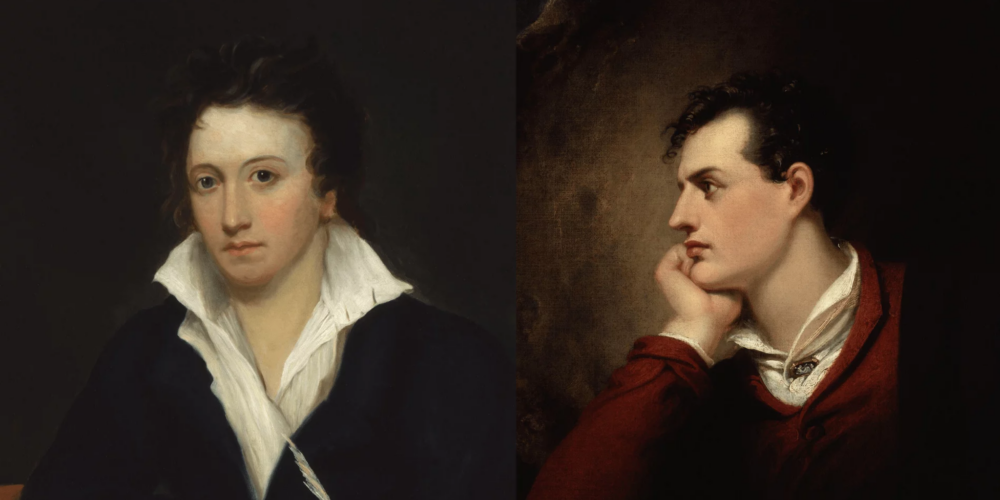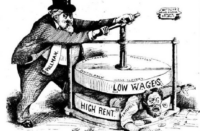Engels said about Shelley: “Byron and Shelley are read almost exclusively by the lower classes; no ‘respectable’ man is likely to have the latter’s work on his table without coming into the most terrible disrepute.”
Born shortly after the French Revolution, Shelley was heir to a substantial estate and also to a seat in Parliament. He attended Eton College and was subsequently enrolled at Oxford. Britain was in political turmoil in the late eighteenth and early nineteenth centuries, with food riots, Luddite rebellion, unrest in Ireland, the threat of Napoleon’s armies, and a growing bourgeois reform movement. The ruling class feared that the example set by the French might infect their own working class and reacted with repression.
The young Shelley took part in campaigns for the release of imprisoned democrats and worked to create an association of radical democratic people. At Eton he began to write and also to express atheist views. Atheism was deemed infinitely more dangerous in repressive Britain than the suspect Dissenters and Catholics. In 1811 Shelley was expelled from Oxford and disowned by his family for publishing The Necessity of Atheism. This is one of the earliest treatises in England on atheism and argues that since faith is not governed by reason there is no evidence for the existence of a god. The universe could always have existed, and if there had been an initial impetus it need not have been a god.
Shelley was a follower of the radical publicist William Godwin, author of An Enquiry Concerning Political Justice (1793), who argued, among other things, for gender equality and against the marital morality of the time. Godwin’s wife, Mary Wollstonecraft, who died in childbirth, had written A Vindication of the Rights of Woman, a foundational document of the early women’s movement, following Paine’s Rights of Man. Both Godwin and Shelley respected the views of the women around them, which included unmarried couples as well as independent women who worked and raised their “illegitimate” children. Shelley rejected marriage as deeply misogynistic and was one of the early advocates of women’s emancipation.
In February 1812 Shelley sailed to Dublin, where he campaigned vigorously for the emancipation of Catholics and the abolition of the Union. In 1811 he had written a “poetical essay” in support of the imprisoned Irish journalist Peter Finnerty, a former editor of the United Irishmen’s journal, the Press.
In preparation for his campaign in Ireland, Shelley had written An Address to the Irish People. His pamphlet Proposals for an Association appealed to the remaining United Irishmen to give Irish politics a more radical direction by peaceful means. Shelley was a great admirer of Robert Emmet and the United Irishmen and wanted to form an association that worked openly towards an egalitarian republic, supported legal equality, and freedom of the press. He also had a Declaration of Rights printed in Dublin, in the tradition of the American Revolution, distributed it, and appeared at various events. Together with John Lawless, an associate of Daniel O’Connell, he planned to found a radical newspaper and to publish a new history of Ireland.
In 1814 he fell in love with Godwin’s daughter Mary. After the suspension of habeas corpus in March 1817 opposition journalists fled or were imprisoned. In March 1818 the Shelleys emigrated to Italy. In the remaining four years of his life Shelley wrote his major works.
Eleanor Marx, in her Shelley lecture, said about his socialism:
Shelley was on the side of the bourgeoisie when struggling for freedom, but ranged against them when in their turn they became the oppressors of the working-class. He saw more clearly than Byron, who seems scarcely to have seen it at all, that the epic of the nineteenth century was to be the contest between the possessing and the producing classes.
Completed in 1813, Queen Mab is a poetic credo and a political poem. In a cosmic dream journey the fairy queen reveals to young Ianthe the misery of humanity in history and the present. Shelley emphatically rejects religious arguments of something intrinsically “sinful” in humankind and cites the real culprits:
Man’s evil nature, that apology
Which kings who rule, and cowards who crouch, set up
For their unnumbered crimes, sheds not the blood
Which desolates the discord-wasted land.
From kings, and priests, and statesmen, war arose,
Whose safety is man’s deep unbettered woe,
Whose grandeur his debasement. Let the axe
Strike at the root, the poison-tree will fall . . .
A garden shall arise, in loveliness
Surpassing fabled Eden.
This poem became known as the “Bible of the Chartists.”
From 1819 onwards Shelley wrote Ode to the West Wind, Prometheus Unbound, Song to the Men of England, and The Mask of Anarchy, one of the greatest political protest poems in the English language. Poems such as Song to the Men of England speak directly to the struggling workers:
V
The seed ye sow, another reaps;
The wealth ye find, another keeps;
The robes ye weave, another wears;
The arms ye forge, another bears.
VI
Sow seed—but let no tyrant reap:
Find wealth—let no imposter heap:
Weave robes—let not the idle wear:
Forge arms—in your defence to bear.
Two hundred years ago, on 8 July 1822, Shelley was drowned. He did not live to see the proletarian movement take possession of his work, but his vision applies undiminished today.






